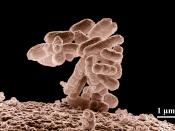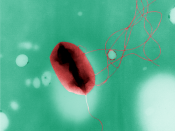E. coliWhat is E. coli?Dictionary definition: A bacillus normally found in the human gastrointestinal tract and existing as numerous strains, some of which are responsible for diarrheal diseases. Other strains have been used experimentally in molecular biology.
E. coli's scientific name is Escherichia Coli O157:H7! (Say that five times fast!) The numbers and letters are in its name because of the other hundreds of types of E. coli, and the specific markers found on its surface. It is not only a tongue twister, but an extremely dangerous type of bacteria.
This particular type of E. coli is one of hundreds of strains of the bacterium E. coli. Most strains are perfectly harmless, living in the intestines of humans and animals. The presence of E. coli and other kinds of bacteria within our intestines is necessary in our intestines for us to develop and operate properly, and for us to remain healthy.
E. coli and other kinds of bacteria provide us with many essential vitamins. We pretty much depend upon E. coli in our intestines for our source of vitamin K and B-complex vitamins. Yet some strains produce a powerful toxin and can cause severe illness.
E. coli was first recognised in 1982 by a German physicist by the name of Theodor von Escherich (1857-1911). The bacteria was named after him. It was recognised because of an outbreak of bloody diarrhea. The illness was then traced to hamburger contamination. Since then, most infections have been caused because of undercooked meat.
What sickness is caused by E. coli?Once infected with E. coli, the worst case scenario would be hemolytic uremic syndrome. This serious disease is the principal cause of kidney failure and death in children, though it is sometimes found in elderly people as well.
In hemolytic uremic syndrome, a person's...


